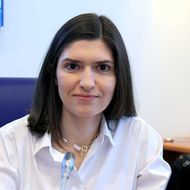‘The World Is Becoming More Complex and Less Predictable’: What Scientists Say about the Future

The future is now more difficult for researchers to forecast, and events that are hard to predict are playing an increasingly significant role. But there is good news too: scientists are confident that humanity will adapt to any changes. This was the focus of discussion at the International Symposium ‘Foresight in a Rapidly Changing World,’ which took place as part of the 25th Yasin (April) International Academic Conference.
Rapid technological progress, alarming climate change, accelerated digitalisation, rising inflation, and stagflation are all contributing to serious transformations. ‘The world is becoming more complex and less predictable,’ noted Yulia Milshina, Deputy Director of the International Research and Educational Foresight Centre at the Institute for Statistical Studies and Economics of Knowledge (ISSEK), HSE University. According to her, rapid changes are causing anxiety and depression among the population. Some researchers link this to the development of digital technologies and a growing sense of insecurity.

Yulia Milshina
‘The digital transformation of education and labour systems is failing to keep pace with current demands, creating a mismatch between human capital and market requirements,’ said Yulia Milshina. Demographic statistics are also a cause for concern. ‘The ageing of the population, as opposed to its size, poses a threat to pension systems and healthcare in developed countries,’ she added.
At the same time, there has recently been an exponential rise in the number of academic publications dedicated to so-called ‘wild cards’—random factors. These are unpredictable events that may prove to be critically important. An early warning system for such events is vital in developing strategies to mitigate the negative consequences of their occurrence, Yulia Milshina explained. While there were over 50 such events recorded in 2022, this number rose to more than 300 by 2025.
The global financial crisis served as a wake-up call that pushed the research community to take low-probability, high-impact events more seriously, she emphasised. Unpredictability makes traditional forecasting difficult. ‘Despite increased awareness, we remain vulnerable to unforeseen circumstances,’ the expert noted. A new societal landscape demands integrated strategies capable of adapting to rapid development. That is why more advanced tools are being developed—tools that ‘enable us to anticipate, absorb, and adapt to such disruptive changes.’
Alena Nefedova, Leading Research Fellow at the HSE ISSEK Laboratory for Economics of Innovation, spoke about iFORA—an intelligent platform for big data and megatrend analysis developed by ISSEK at HSE University.
Among the megatrends that will shape the future, Alena Nefedova highlighted climate change, increased attention to physical, psychological, and emotional wellbeing, the transformation of the education system, and global shifts in the labour market. At the same time, she stressed that within science itself, the development of interdisciplinary research is becoming increasingly important.

Alena Nefedova
‘Universities began conducting interdisciplinary research as far back as the mid-20th century, in collaboration with industry. By the 1970s, interdisciplinarity was recognised as vital for strengthening universities as key players in innovation ecosystems,’ noted Alena Nefedova. She also emphasised the growing influence of digitalisation on scientific activity. ‘We now have virtual forums, virtual laboratories, international projects, and the open science movement—all of which support the sharing of scientific data and findings,’ she added.
Fabienne Goux-Baudiment from the proGective research laboratory (France) noted that the world has changed dramatically. ‘One of the catalysts for these changes has been carbon. We can see that the large-scale use of carbon leads to global warming and climate change. Another catalyst is silicon. Thanks to silicon, we now have generative artificial intelligence—and it is capable of competing with humans,’ she said. And finally, according to Ms Goux-Baudiment, the third major trend we are currently witnessing is widespread chaos. This is particularly evident in the economy and geopolitics. But change, she reassured, is ‘not some anomaly—it is a natural part of human evolution and of life itself.’ Society is evolving, and technology is accelerating that evolution. We may, she believes, ‘make a quantum leap into an entirely new state.’ ‘One world is essentially fading away, and—albeit not instantly—a new world is emerging,’ she said. However, since we often resist change, this process is slowed down. Nevertheless, we are still entering an era of acceleration.
The world will no longer be as we know it today, but this transition does not spell the end of humanity, the futurist said. ‘First of all, this is not the first time humanity has faced large-scale change. Secondly, human beings are generally quick to adapt. And thirdly, this time we know what is happening. We are aware of it. That means we can take action,’ she reassured.
In her view, a new mindset is beginning to take shape. ‘More and more people are recognising that the way we think, govern, and produce no longer matches the demands of the time. This is not just a subtle shift. The younger generation is not just asking what they want to do—they are thinking about what kind of world they want to create together with like-minded people. Pessimism is not the answer. We must experiment and create new formats,’ Fabienne Goux-Baudiment concluded.
The International Symposium ‘Foresight in a Rapidly Changing World’ took place at HSE University on April 17–18, 2025.
See also:
Applications for Participation in XXVI April International Academic Conference Still Open
Applications can be submitted on the conference website until December 16, 2025. The programme has been developed around five research themes: Economics, Human Capital and Society, Instrumental Methods and Models, Foresight Research, and International Research. The heads of these areas have presented, in video format, the priority topics and sections for which they are expecting submissions.
'We Are Not Trying to Guess the Future—We Are Creating It': HSE University Experts Discuss 21st-Century Trends and Scenarios
Experts from HSE University participated in the II International Symposium 'Inventing the Future.' During the panel discussion 'Horizons of the Future: Trends, Challenges, and Scenarios,' organised by the HSE Institute for Statistical Studies and Economics of Knowledge (ISSEK), researchers explored the role of foresight and big data analysis in shaping visions of the future and identifying global megatrends that will drive the world’s development in the coming decades.
Applications to Participate in April International Academic Conference Now Open
HSE University is now accepting proposals to present academic reports at the XXVI April International Academic Conference named after Evgeny Yasin. Applications can be submitted until December 16, 2025. The conference events will take place mainly on-site in Moscow from April 14 to 17, 2026.
Global AI Trends Discussed at International Foresight Workshop at HSE University
At an international foresight workshop on artificial intelligence held at HSE University, Russian and foreign scholars discussed the trends and challenges arising from the rapid development of AI.
24 Countries Represented at 25th Yasin International Academic Conference Held by HSE University
The Programme Committee of the 25th Yasin (April) International Academic Conference on Economic and Social Development has summed up the initial results. In 2025, 1,384 people from 24 countries and 29 Russian regions participated in the conference, with 335 of them delivering presentations.
‘In the Next 20 Years, We Will Stop Aging’
The 25th Yasin (April) International Academic Conference on Economic and Social Development brought together leading Russian and Western scientists. Among the guests was Jose Luis Cordeiro, PhD, international fellow of the World Academy of Art and Science, Chair of the Millennium Project's Venezuela node, former professor at MIPT and HSE University, and author of The Death of Death.
Stuck in the Net: How Much Time Children Spend Online
On average, a schoolchild spends 48 hours a week on studies—equivalent to a six-day working week for an adult. This was highlighted by experts at the round table ‘Domains of Children’s Well-Being Evaluation for Human Potential and Evidence-Based Social Policy Development,’ held as part of the 25th Yasin (April) International Academic Conference.
Russian and Chinese Scholars Share Experience of Transformation of Doctoral Education
The Russian and Chinese postgraduate education systems originally borrowed their institutional frameworks from the Soviet Union. However, in the 21st century, they have evolved along different paths. While key performance indicators for postgraduate programmes in Russia are declining, China is seeing a rapid increase in the number of postgraduate students. These contrasting trajectories and the reforms undertaken in each country in recent decades were the focus of a roundtable discussion held as part of the 25th Yasin (April) International Academic Conference.
Nobel Laureate Proposes Solution to Markov Equilibrium Problem
In dynamic games, a Markov equilibrium involves strategies that guide players' behaviour based on the current state of the game, rather than its entire history. This approach is effective when players have access to complete information. But when uncertainty arises in the game—for instance, when players are unsure of who they are dealing with—this approach can become problematic. Eric Maskin, Nobel Laureate in Economics and Professor at Harvard University, addressed this issue in a paper presented at the XXV Yasin (April) International Academic Conference on Economic and Social Development held at HSE University from April 15 to 18, 2025.
Fragmentation and Bloc Formation: How the Global Economy is Changing
Sergey Dubinin, former head of the Bank of Russia and Professor of Finance and Credit at the Faculty of Economics at Moscow State University, has delivered an honorary address at the XXV Yasin (April) International Academic Conference. He spoke about the transformation of the global monetary and financial system, as well as the Russian economy.


